Brother Jonathan
and Uncle Sam
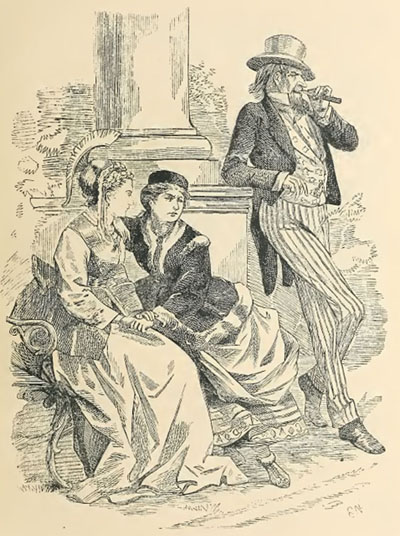
Canadian Caricatures
1849 - 1878
By Doug Boilesen 2023
The following Canadian cartoons from
1849 to 1878 were part of the compilation "A Caricature History
of Canadian Politics - Events from the Union of 1841, as from Grip,
and Vaious Other Sources," by The Grip Printing & Publishing
Co., 1886.
The preface of that book notes that
"CARICATURE HISTORY”
does not mean that history is caricatured. On the contrary, a good
caricature enables us to see, in a true light, facts that might
otherwise be hidden or misrepresented. We understand current events
and the social life of England from the illustrations of "Punch"
more truly than from the columns of the "Times" or the
"Morning Post." (Ibid.
p. 7)
The extracted cartoons here are limited
to Brother Jonathan and Uncle Sam as depicted by Canadian
newspapers and cartoonists. As such they reveal who the cartoonists
felt was the appropriate US symbol (i.e., Brother Jonathan or Uncle
Sam) to portray in various subjects related to US-Canadian relationships
-- primarily annexation of Canada, but also US government policies
affecting Indian and human rights, financial interests and trade
agreements/disputes, etc.
Each cartoon is preceded with a description/interpretation
of the artwork, and its source.


Results of the Annexation Engine as
exemplifed by Brother Jonathan, Punch in Canada, 1849.
A Caricature History of Canadian
Politics by J.W.A. Bengough, Vol. 1&2, Toronto: The Grip Printing
& Publishing Co., 1886, p. 43 (Courtesy Library of the University
of Toronto).
The attempt to pawn the British flag
to Brother Jonathan is the 1886 description for this cartoon. The
doorway of the pawnship has a sign, however, that says "Uncle
Sam," perhaps reflecting how the roles and identification of
Uncle Sam and Brother Jonathan were still being defined in the 1880's.
The attempt to pawn England's flag ties into the question of annexation
which in the previous Punch 1849 showed Brother Jonathan
driving the Annexation Engine. Punch in Canada, 1849.
A Caricature History of Canadian
Politics by J.W.A. Bengough, Vol. 1&2, Toronto: The Grip Printing
& Publishing Co., 1886, p. 43 (Courtesy Library of the University
of Toronto).


The Canadian opinion
on the question of Annexation by the US was represented in this
1869 cartoon (with Cousin (Brother) Jonathan as the intended
spouse). Diogenes, June 18, 1869.
A Caricature History of Canadian
Politics by J.W.A. Bengough, Vol. 1&2, Toronto: The Grip Printing
& Publishing Co., 1886, p. 47 (Courtesy Library of the University
of Toronto).

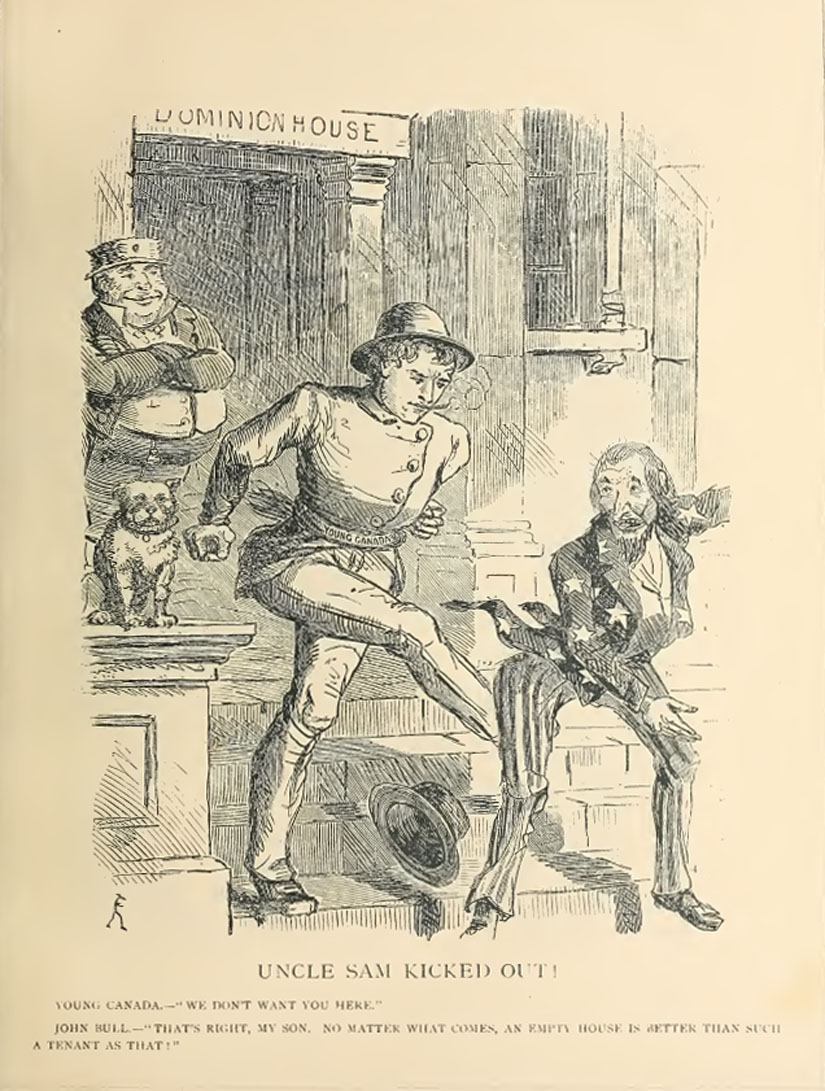
The anti-annexation sentiment
in Canada wanted to literally kick-out Uncle Sam from Canada in
this 1869 cartoon. Grinchuckle, September 23, 1869.
A Caricature History of Canadian
Politics by J.W.A. Bengough, Vol. 1&2, Toronto: The Grip Printing
& Publishing Co., 1886, p. 109 (Courtesy Library of the University
of Toronto).

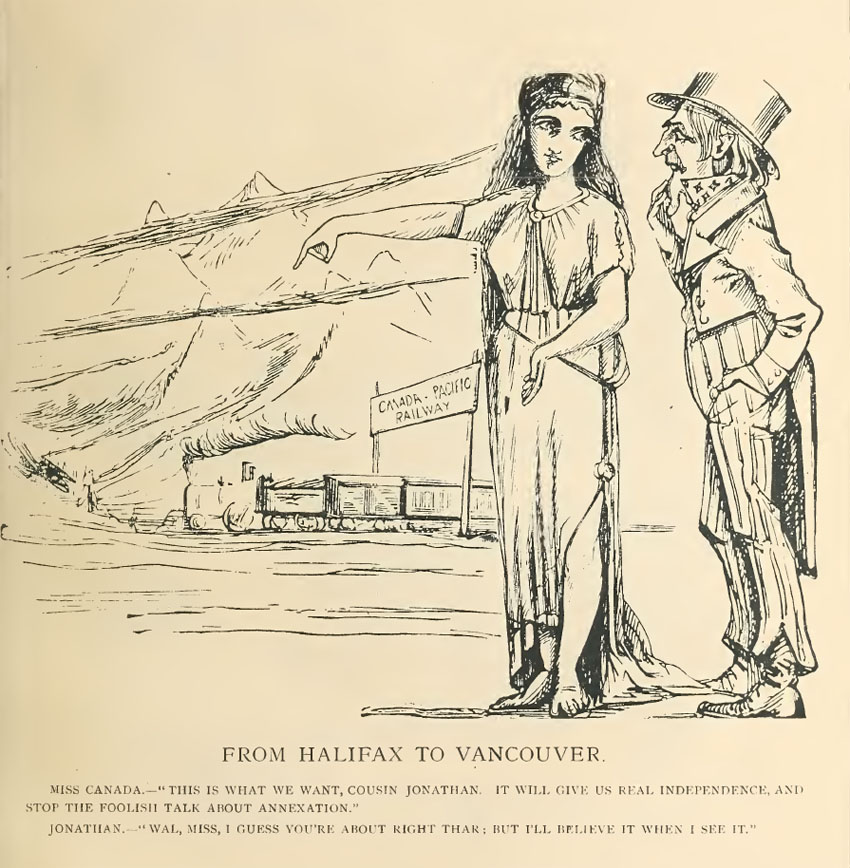
Miss Canada explains
to Brother (Cousin) Jonathan that building the Canada-Pacific Railway
should stop the "foolish talk about annexation." Brother
Jonathan responds with a country bumpkin dialect of "Wal,
Miss, I guess you're about right thar..." Diogenes, November
5, 1869.
A Caricature History of Canadian
Politics by J.W.A. Bengough, Vol. 1&2, Toronto: The Grip Printing
& Publishing Co., 1886, p. 109 (Courtesy Library of the University
of Toronto).
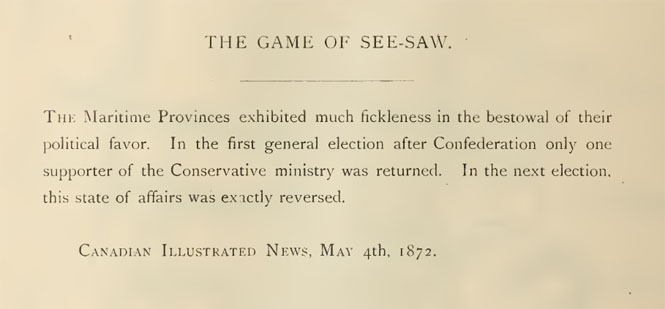
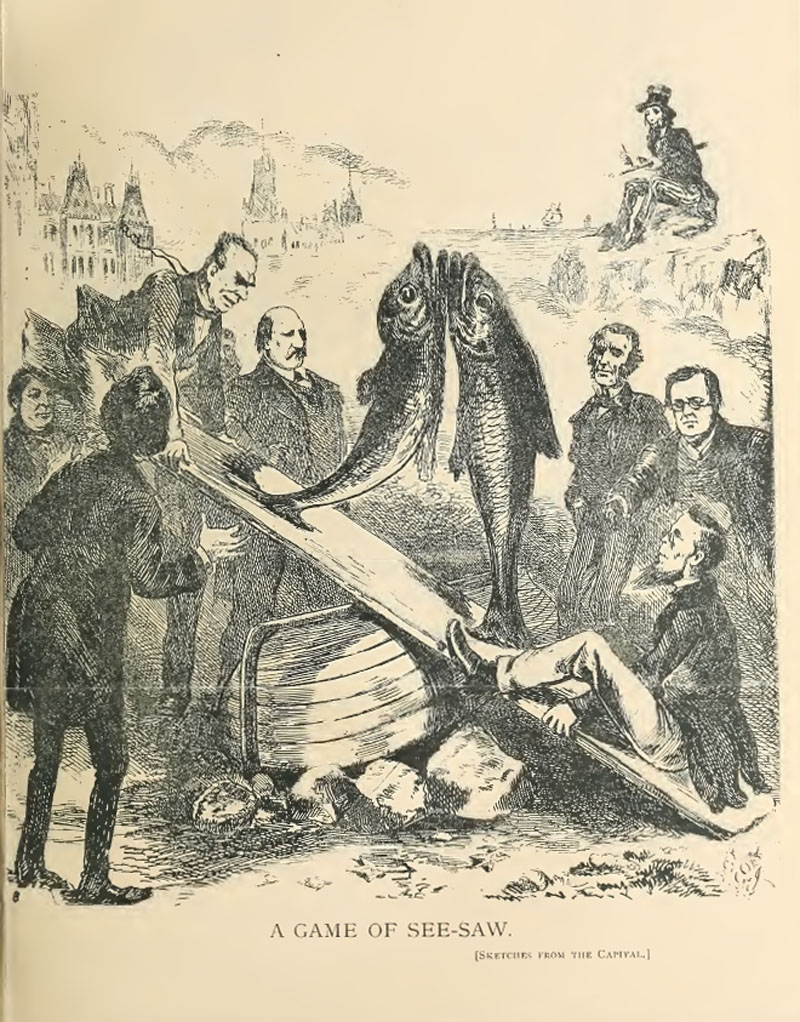
Two Canadian Maritime
Provinces vie for political favor in Confederation elections which
are experiencing reversals in results. Meanwhile, Uncle Sam observes
from a hill in the distance. Canadian Illustrated News, May
4, 1872.

A Caricature History of Canadian
Politics by J.W.A. Bengough, Vol. 1&2, Toronto: The Grip Printing
& Publishing Co., 1886, p. 147 (Courtesy Library of the University
of Toronto).

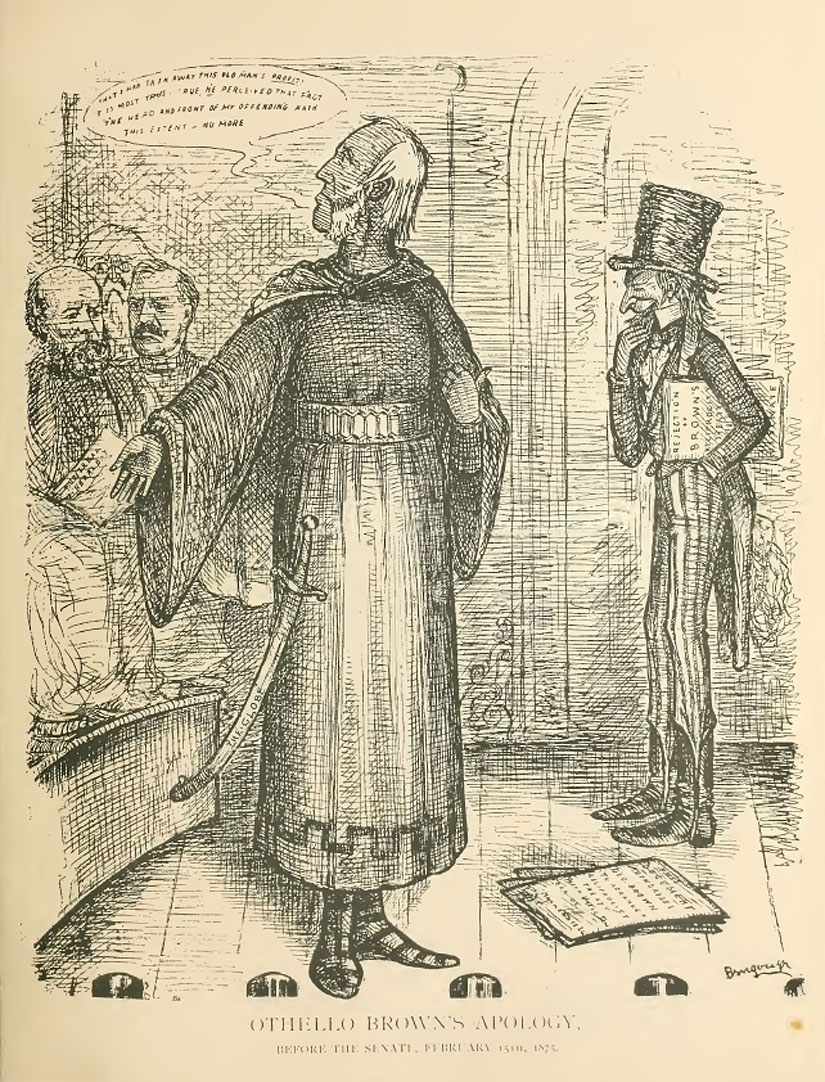
Canadian Senator Brown's
mission to the Washington to secure a reciprocity treaty between
Canada and the United States failed. As Brown apologized to the
Canadian Senate for his failure he explains why it happened:
"That I had taken away this
old man's Profit! It is most True. True, he perceived that
fact. The head and front of my offending math. This extent - No
more."
Listening on the stage with Brown,
Uncle Sam is seen chuckling with laughter. Grip, February
27, 1875.
A Caricature History of Canadian
Politics by J.W.A. Bengough, Vol. 1&2, Toronto: The Grip Printing
& Publishing Co., 1886, p. 253 (Courtesy Library of the University
of Toronto).
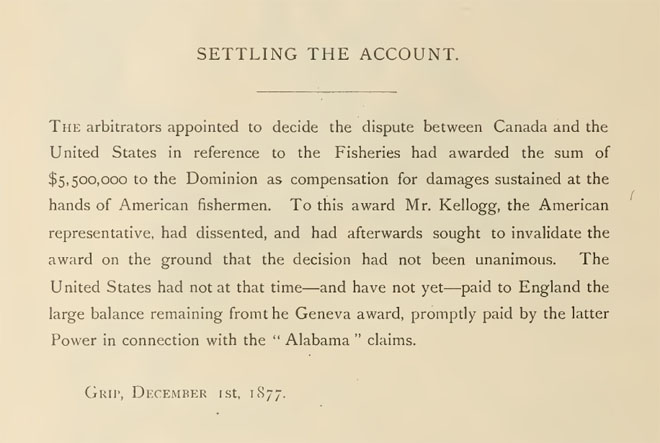

In a fisheries dispute
with Canada which went against the United States, the American representive
Mr. Kellogg sought to invalidate the decision since he said it was
not unanimous. Jonathan, defending the US position says "Crawl
out of that loophole? Hunkerslide? Never! Grip, December
1, 1877.
A Caricature History
of Canadian Politics by J.W.A. Bengough, Vol. 1&2, Toronto:
The Grip Printing & Publishing Co., 1886, p. 377 (Courtesy Library
of the University of Toronto).
Note: In the book's introductory
section SKETCH OF CANADIAN POLITICAL HISTORY, the following
provided background about the 1872 Washington Treaty granting fishing
rights to the United States in Canadian water and the $5,500,000
award which was eventually paid after "much grumbling by Congress."
In 1872 Sir John
Macdonald was appointed one of the British Commissioners for the
arrangement of a treaty involving the fishery interests of Canada,
amongst other important matters, as between Great Britain and the
United States. The result of the Commissioners’ labors is known
as the Washington Treaty, which was ratified in that year. By this
document, inter alia, the right to take fish in Canadian waters
was extended to the United States for the period of ten years in
consideration of a money payment, the amount subsequently. agreed
upon by a joint Commission, which met at Halifax in 1877, being
$5,500,000. This the Americans paid, but only after a protest on
flimsy grounds by their representative, Mr. Kellogg, and much grumbling
by Congress. (Ibid. p. 31).
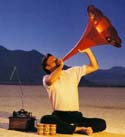
Annotations - Phonographia.com
|